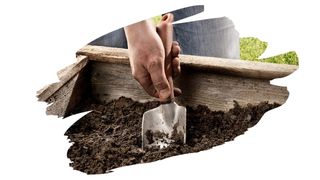The best type of wood finish for a garden bed is one that won’t leach toxic chemicals into soil. Which is why untreated solid wood — typically made from a rot-resistant durable lumber such as Cedar — is a safe choice for your garden.
But, when it comes to minimizing the chemical contamination risk, you also need to watch out for the chemicals inside wood finishes too.
So, when it comes to Teak oil, what can you expect to find in this popular wood finish?
Well, in this post, you will learn what type of wood finish is the safest type for a raised bed. You will also learn what really goes into Teak oil — and why this finish is a world away from natural wood finishes like Linseed oil and Tung oil.
And keep reading to discover which plant-safe wood sealer is the best one for weatherproofing your garden bed.

This post may contain affiliate links to products that we receive a commission for (at no additional cost to you). Learn more here.
What Is The Safest Wood Finish For A Raised Garden Bed?
The safest type of wood finish for a raised garden bed is none at all. Using untreated wood, and leaving that wood unfinished, removes the chance of any chemicals leaching into soil.
Now, untreated wood is simply natural wood that’s free of chemical wood preservatives. While treated wood has been ‘treated’ and infused with chemicals designed to help prevent wood rot.
But, the problem with using treated wood for a raised bed, is that the chemicals in these wood preservatives are pretty toxic. In fact, some of those wood preservatives, (such as Chromated copper arsenate), can even contain arsenic.
Having said that, treated wood will last much longer outside — especially in rainy and more humid climates — than untreated wood. And the same also goes for wood that’s been coated with a water-resistant wood finish.
But Won’t Leaving Wood Unfinished Mean That It’ll Rot Away Quickly?
It depends on the type of wood.
As a general rule of thumb, wood that’s exposed to a lot of moisture and humidity, will rot away quickly. But, there are certain types of wood that are naturally more adept to surviving humid conditions. These wood types can handle moisture well enough to stave off rot, making them ideal for outdoor structures.
So, rot-resistant timbers, such as Red Western Cedar and White Oak, are great choices for making a raised bed.
Related Post: Can You Really Use Untreated Oak For Raised Beds?
Now, having said all that, even a durable rot-resistant lumber will benefit from a weatherproofing finish. So, for a truly long lasting garden bed, you should apply some kind of wood sealer to protect it.
What About Teak Oil? Is Teak Oil A Good Exterior Wood Sealer?
No it is not. It’s a good finish for interior pieces, but it’s not the most durable (or most water-resistant) finish out there.
On frequently used wooden surfaces, a teak oil finish will become worn down within months. Which is why this wood finish often needs a reapplication every 6-12 months.
And, while Teak oil can shrug off water spills, it is not the most water-resistant top coat. And it is certainly no polyurethane when it comes to waterproofing. That’s why if Teak oil gets drenched in enough rainwater, this finish can become damaged.
Related Post: Can You Use Polyurethane On Tree Bark Decorations?
Isn’t Teak Oil At Least Somewhat Waterproof?
Teak oil is not a waterproof finish. It is more of a water-repelling coat.
Teak oil can reduce the amount of water that wood absorbs. However, it doesn’t stop all moisture from soaking down into wood grain.
This is the main reason why Teak oil isn’t suitable for a raised garden bed — particularly as it won’t last too long in all-weather. But, this oils lack of suitability as an outdoor wood sealer is the least of your concerns.
And why is that? Well, because the chemicals used to make Teak oil aren’t the kind that you’d want to risk soaking into your garden soil.
Related Post: Is Teak Oil Food Safe Enough For A Chopping Block?
Wait… Does That Mean Teak Oil Is Toxic? What Is Teak Made Of?
Despite sharing a name with Teak wood, Teak oil is not actually sourced from this tree. Instead, Teak oil is a manufactured blend of natural oils, (such as Linseed oil or Tung oil), along with mineral spirits, thinners and other solvents.
Basically, it’s a hodge-podge of both natural and toxic ingredients.
What’s more, there is no standard Teak oil recipe. The wide range of Teak oil products available in stores each have their own balance of ingredients.
So What Kind Of Finish Can I Use On My Raised Vegetable Garden Bed?
Use a non-toxic exterior wood sealer, rather than a Teak oil wood finish.
Wood sealers will do a much better job at protecting and weatherproofing exterior lumber. Which is why you should use ‘Seal It Garden Bed Wood Sealer’ for your raised bed.
This eco-friendly product is plant-safe and free of harmful chemicals. And it’s been specially formulated so that it bonds right onto wood. Which is why there’s little chance of it slipping off into soil.
What’s more, unlike Teak oil, this sealer doesn’t need frequent reapplications, since it can protect wood for over 10 years.
But, most importantly, it is a non-toxic sealer that’s free of solvents, metals, and sulphate’s. So you needn’t worry about those harmful chemicals getting into your vegetable garden soil.
You can check out the latest prices for this plant-safe wood sealer by popping on over to Amazon.
To Wrap Up, Here Are The 3 Key Takeaways From This Post…
- 1). Teak oil is not a wholly natural oil. It is a toxic finish made up of a blend of natural oils, solvents, and mineral spirits.
- 2). Teak oil wood finishes, when used on outdoor structures, will need to be reapplied frequently (every 6-12 months).
- 3). So instead, use a non-toxic wood sealer to help weatherproof your garden bed.
References:
Chromated copper arsenate–treated wood: A potential source of arsenic exposure and toxicity in dermatology | National Center for Biotechnology Information



![A Quick Beginners Guide To Rubber Wood Vs Teak Wood [For Furniture] rubber wood vs teak wood](https://www.thewoodworkplace.com/wp-content/uploads/2022/11/Banner-523-150x150.jpg)